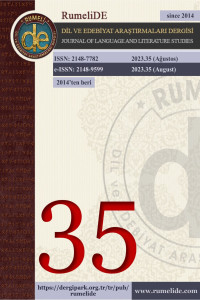Abstract
References
- Barad, K. (2003). Posthumanist Performativity: Toward an Understanding of How Matter Comes to Matter. Signs: Journal of Women in Culture and Society, 28(3), 801–831. http://www.jstor.org/stable/10.1086/345321?origin=JSTOR-pdf
- Barad, K. (2007). Meeting the Universe Halfway: Quantum Physics and the Entanglement of Matter and Meaning. Durham: Duke University Press.
- Buell, L. (2001). Writing For an Endangered World: Literature, Culture and Environment in the U.S. and Beyond. Cambridge: The Belknap University Press of Harvard.
- Carson, Rachel. (1961). The Sea Around Us. New York: Open Road.
- DeLoughrey, E.M., R.K. Gosson and G.B. Handley. (2005). Caribbean Literature and the Environment: Between Nature and Culture. Charlottesville: U. of Virginia P.
- Deckard, Sharae. (2010). Jungle Tide, Devouring Reef: (Post) Colonial Anxiety and Ecocritique in Sri Lankan Literature. Bonnie Roos and Alex Hunt (Ed.), in Postcolonial Green: Environmental Politics and World Narratives. (p. 32-48) Charlottesville: University of Virginia Press.
- Jain, Shalini. (2012). Romancing the Environment: Romesh Gunesekera’s Reef and Heaven’s Edge. South Asian Review, 33:3, 29-49. DOI: 10.1080/02759527.2012.11932894 Glotfelty C. (1996). Literary Studies in an Age of Environmental Crisis. Harold Fromm ve C. Glotfelty, (Ed.), in The Ecocritisim Reader: Landmarks in Literary Ecology. (p. xv-xxxvii). Athens, Georgia: The University of Georgia Press.
- Ghosh, Amitav. (2005). The Hungry Tide. Boston: Houghton Mifflin Company.
- Gunesekera, Romesh. (1994). Reef. London: Granta Publications.
- Mukherjee, Upamanyu Pablo. (2010). Postcolonial Environments: Nature, Culture and the Contemporary Indian Novel in English. New York: Palgrave MacMillan.
- Nixon, Rob. (2005). Environmentalism and Postcolonialism. Ania Loomba, (Ed.), in Postcolonial Studies and Beyond. (p. 233-251). Durham, NC: Duke UP.
- Perera, W. (1995). Images of Sri Lanka through Expatriate Eyes: Romesh Gunesekera’s Reef. The Journal of Commonwealth Literature, 30(1), 63–78.
The Roaring Sea’: The Analysis of Material Agencies in Terms of Their Ecological Impacts in Romesh Gunesekera’s Reef
Abstract
This article focuses on the agency of the non-human environment and the ability of the non-human, whether animate or inanimate, to affect and change the human world in Romesh Gunesekera’s Reef. I discuss the agency of the food and the reef in the novel in their relationship to creating and shaping the identity of Triton by employing new materialist theory introduced by Karen Barad. I discuss that the agencies of the reef and the food are as crucial as human agencies since they have the power to shape humankind and culture, which is observable in the form of wrong post-colonial economic development policies, investments and, most importantly, the demise of the scientific research of Mr. Salgado in the novel. I also claim that Triton, who is not affected by the agency of the reef and the ocean. while they were visiting the research post of Mr. Salgado, will be an outstanding cook producing meals that would intoxicate Mr. Salgado and other characters, which will result in the disruption of Mr. Salgado’s research on the coral reef.
Keywords
Ecocriticism postcolonialism posthumanism matter new materialism material agency coral reef food
References
- Barad, K. (2003). Posthumanist Performativity: Toward an Understanding of How Matter Comes to Matter. Signs: Journal of Women in Culture and Society, 28(3), 801–831. http://www.jstor.org/stable/10.1086/345321?origin=JSTOR-pdf
- Barad, K. (2007). Meeting the Universe Halfway: Quantum Physics and the Entanglement of Matter and Meaning. Durham: Duke University Press.
- Buell, L. (2001). Writing For an Endangered World: Literature, Culture and Environment in the U.S. and Beyond. Cambridge: The Belknap University Press of Harvard.
- Carson, Rachel. (1961). The Sea Around Us. New York: Open Road.
- DeLoughrey, E.M., R.K. Gosson and G.B. Handley. (2005). Caribbean Literature and the Environment: Between Nature and Culture. Charlottesville: U. of Virginia P.
- Deckard, Sharae. (2010). Jungle Tide, Devouring Reef: (Post) Colonial Anxiety and Ecocritique in Sri Lankan Literature. Bonnie Roos and Alex Hunt (Ed.), in Postcolonial Green: Environmental Politics and World Narratives. (p. 32-48) Charlottesville: University of Virginia Press.
- Jain, Shalini. (2012). Romancing the Environment: Romesh Gunesekera’s Reef and Heaven’s Edge. South Asian Review, 33:3, 29-49. DOI: 10.1080/02759527.2012.11932894 Glotfelty C. (1996). Literary Studies in an Age of Environmental Crisis. Harold Fromm ve C. Glotfelty, (Ed.), in The Ecocritisim Reader: Landmarks in Literary Ecology. (p. xv-xxxvii). Athens, Georgia: The University of Georgia Press.
- Ghosh, Amitav. (2005). The Hungry Tide. Boston: Houghton Mifflin Company.
- Gunesekera, Romesh. (1994). Reef. London: Granta Publications.
- Mukherjee, Upamanyu Pablo. (2010). Postcolonial Environments: Nature, Culture and the Contemporary Indian Novel in English. New York: Palgrave MacMillan.
- Nixon, Rob. (2005). Environmentalism and Postcolonialism. Ania Loomba, (Ed.), in Postcolonial Studies and Beyond. (p. 233-251). Durham, NC: Duke UP.
- Perera, W. (1995). Images of Sri Lanka through Expatriate Eyes: Romesh Gunesekera’s Reef. The Journal of Commonwealth Literature, 30(1), 63–78.
Details
| Primary Language | English |
|---|---|
| Subjects | British and Irish Language, Literature and Culture |
| Journal Section | World languages, cultures and litertures |
| Authors | |
| Publication Date | August 21, 2023 |
| Published in Issue | Year 2023 Issue: 35 |

